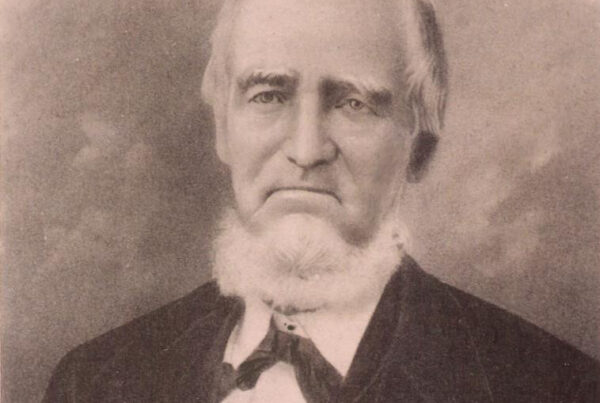One of the greatest legal minds of the founding generation was also one of the most reserved and unobtrusive. On many levels, he differed from his peers. Outspoken Federalist from New York, John Jay, became the first Chief Justice of the United States Supreme Court. Prominent Virginia Governor Edmund Randolph was selected by George Washington to be the first Attorney General. Patrick Henry, who was an incredibly effective lawyer, became known as one of the greatest orators of his time. James Iredell did none of this – he was plainly overshadowed and eclipsed by his haughtier peers. Still, his life is worth studying for his unshakable consistency to the constitutional principles he espoused.
After a modest upbringing in Lewes, England, Iredell immigrated to Edenton, North Carolina at the age of 17. For a time, he collected custom duties from Port Roanoke in Edenton. He began to study law under the tutelage of one of the most prominent lawyer in North Carolina, Samuel Johnston. At an extremely young age, he completed the training necessary to practice before North Carolina and passed the bar in 1771.
Unquestionably, Iredell was a legal prodigy. He immersed himself in most important legal literature of his time, and devoted his life to the pursuit of legal knowledge. He was well acquainted with the British constitutional system, especially the work of William Blackstone. Blackstone’s Commentaries on the Laws of England was the most important English legal treatise, and Iredell grasped its maxims like few others in America.
Ironically, it was a disagreement with Blackstone’s treatise that gave rise to Iredell’s rise to fame. Just prior to the American War for Independence, he penned a pamphlet, To the Inhabitants of Great Britain, which espoused his constitutional arguments against the British concept of Parliamentary sovereignty. This principle, which was incorporated into the British unwritten constitution following the Glorious Revolution, held that parliamentary policies superseded any sectional power balances held by Britain’s colonies and its king.
Iredell gave several reasons to refute this principle. First, he noted that the colonial charters were bestowed upon the colonies long before the principle of parliamentary sovereignty was instituted and accepted in England. He wrote that American colonies had been safeguarded “by the severe labor and virtue of their ancestors.” Iredell wrote that colonial forefathers had come abroad “with the utmost difficulty, expense, and hazard, and for many years almost entirely at their own risk….by their own and their children’s labor.” This argument was echoed the same year by Thomas Jefferson in his famous pamphlet, A Summary View of the Rights of British America. Both men insisted that the toils, struggles, and risks their ancestors took to establish and preserve the colonies superseded the original act of parliamentary sanction. As such, the colonies were built on the backs of previous generations of inhabitants, not the crown. Since the colonies developed separate identities, with local legislatures and autonomous governments, they were considered by Iredell to be federalized units of the whole. The common attachment the colonies shared with other parts of British Empire was to the king, not to a singular legislature.
Iredell also insisted that it is a government’s responsibility to provide happiness for its people. Ignoring this precept, Iredell reasoned, would invalidate the legitimacy of such a government. “A free government can only subsist by the general confidence of the people,” he wrote. When policy is formulated, all parts should play a role in its foundation:
“Where an empire is divided into several different and distinct states, the aggregated good of all these ought to be consulted. For where would be the justice to regard only one or two of these as worthy of the care and tender provision of laws, and expose the rest to chance, or the very uncertain, whimsical caprice, or mean rapacity of the others?”
Iredell wrote that the natural condition of mankind was happiness, and that the denial of this value is an unnatural displacement of this temperament. Government transgression in this area would be “totally destructive of this universal right.” Associating this principle with the lack of colonial representation in British Parliament, Iredell considered Britain negligent of American happiness.
On the question of whether acts of British Parliament should be binding on American colonies, Iredell made his opinion unmistakable. “This is not the condition of freemen, but of slaves. It is the very definition of slavery.” On the argument that two independent legislatures (British Parliament and the colonial legislatures) would clash on every issue, he mentioned that each legislature was established on “a separate scale, and employed about different objects.” Therefore, British Parliament could legislate for the empire, but should not interfere in the local, confined matters of the colonies. In matters of great controversy, Iredell recognized the king as the common executive of the British Empire, and recommended a veto of all contentious laws that would oppress the colonies. “His negative can prevent the actual injury to the whole of any positive law in any part of the empire,” he wrote.
Since it was widely read, Iredell’s pamphlet catapulted his popularity within North Carolina, and afforded him an avenue into local politics. Astoundingly, he was only 23 years old when it was published.
Iredell’s public career went far beyond writing. Finding himself in support of the finalized United States Constitution, his most significant contribution to North Carolina’s ratification campaign was his insistence that the state governments would retain their present judicial authority under the new model. He did this by describing the Constitution as an instrument that prevented the federal government from encroaching upon issues outside of its own defined jurisdiction:
“When Congress passes a law consistent with the Constitution, it is to be binding on the people. If Congress, under pretense of executing one power, should, in fact, usurp another, they will violate the Constitution.”[1]
William Richardson Davie, another supporter of the Constitution, responded in concurrence:
“gentlemen should distinguish that it is not the supreme law of the land in the exercise of a power not granted. It can be supreme only in cases consistent with the powers specifically granted, and not in usurpations.”[2]
After Iredell explained the division of judicial powers under the Constitution, it was accepted that the state courts and general government courts could both remain, both holding judicial authority within their own sphere of recognized powers. Prominent skeptic Samuel Spencer noted, “I am ready to say that I most heartily wish that whenever this government takes place, the two jurisdictions and the two governments, that is, the general and the state governments may go hand in hand, and that there may be no interference, but that every thing may be rightly conducted.” Spencer stated that he had “no doubt but there is wisdom enough in this state to decide the business in a proper manner, without the necessity of federal assistance to do our business.”[3] Iredell insisted that federal courts and state courts could coexist by respecting separate jurisdictions.
An honest supporter of the original United States Constitution, Iredell’s integrity surpassed many of his peers. Unlike some ambitious Federalist counterparts, he never sought to destroy the original aim and intention of how the Constitution was sold in the state ratification conventions. Instead, he held to the notion that the Constitution was the same document that he had helped explain in North Carolina’s ratification convention.
Just months after North Carolina ratified the Constitution, George Washington nominated James Iredell to be one of the original six justices for the United States Supreme Court.
Iredell’s most heroic stance against the expansion of federal power was made in 1793. That year, in the case of Chisholm v. Georgia, the Supreme Court attempted to hear a suit concerning the repayment of debts in a case between Georgia and a citizen of another state. In protest, Georgia did not represent itself in the suit and refused to appear, correctly claiming that the Constitution did not grant this type of authority to the federal judiciary. Without consenting to suit, Georgia insisted that as a sovereign entity it was shielded from federal jurisdiction. Nonetheless, the John Jay Court awarded judgment to the plaintiff in a four to one decision.
Iredell, the lone dissenter, strongly disagreed. He wrote that he was “not fully persuaded” that the federal judiciary had the authority to hear the suit:
“I believe there is no doubt that neither in the State now in question nor in any other in the Union, any particular legislative mode, authorizing a compulsory suit for the recovery of money against a State, was in being either when the Constitution was adopted, or at the time the Judicial Act was passed.”
Taking the side of the states rather than the Federalist judiciary, the federal Congress immediately set out to correct this wrongdoing by crafting a proposal for what would become the 11th Amendment to the Constitution. This amendment was quickly ratified within less than a year of its passage through Congress. The amendment made the principle of “sovereign immunity” explicit, creating a defined limitation against the federal judiciary.
This process, which was a clear demonstration of early state resistance against the expansion of the federal judiciary and encroachment of the federal government, was sparked by Iredell’s dissent. In conspicuous fashion, Iredell had acted in full alignment with the views he had expressed when the Constitution was being debated in his state.
Iredell passed away in 1799, long before the federal judiciary siphoned immense power from the states and adopted the confounding proclivities of the John Marshall Court. For his part, Iredell had nothing to do with this alarming transition – he defended the Constitution as it was accepted by the states, not as it was molded by the energetic masterminds of the Federalist Party. Had he survived longer, he very well may have used his position to check the growing influence of Marshall.
[1] Quoted in Brion McClanahan, The Founding Fathers Guide to the Constitution (Washington, DC: Regnery History, 2012), 160.
[2] The Debates in the Several State Conventions on the Adoption of the Federal Constitution, Volume IV, 182.
[3] Ibid, 153.






